| Srl | Item |
| 1 |
ID:
096654
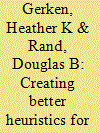

|
|
|
|
|
| Publication |
2010.
|
| Summary/Abstract |
Heather K. Gerken and Douglas B. Rand propose creating citizen assemblies to vet presidential hopefuls in order to give low-information voters a useful heuristic for casting their votes. Their conceptual claim is that citizen assemblies should be of interest to the vast swaths of political science preoccupied with making representative democracy work. By shearing away the deliberative baggage that has long accompanied proposals like this one, the authors highlight the role that citizen assemblies can play in helping low-information voters make sensible choices.
|
|
|
|
|
|
|
|
|
|
|
|
|
|
|
|
| 2 |
ID:
096663


|
|
|
| 3 |
ID:
096656
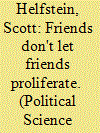

|
|
|
|
|
| Publication |
2010.
|
| Summary/Abstract |
Scott Helfstein examines the efficacy of economic sanctions as a tool to counter nuclear proliferation. He argues that contrary to conventional wisdom, international cooperation is not a key determinant in sanction success. Instead, empirical evidence shows that sanctions have been effective at altering nuclear policies only when the sanction sender and target have had friendly relations.
|
|
|
|
|
|
|
|
|
|
|
|
|
|
|
|
| 4 |
ID:
096659


|
|
|
|
|
| Publication |
2010.
|
| Summary/Abstract |
This article elaborates a heuristic approach to understanding the geography of warscape from a theoretically informed perspective. It argues that agency in protracted civil war emerges at the ambiguous interface of different, competing systems of power and authority. In order to account for the multiple trajectories of threat and opportunity that warscapes offer to different social actors and at different times and places, the article proposes the concept of 'governable order', which is derived from a critical review of the literature on 'social navigation' and 'governable space(s)'. The usefulness of combining these three concepts is illustrated by two empirical vignettes. They demonstrate the dynamics of governable spaces in distinct phases of the Sierra Leone and Sri Lanka civil wars. The two cases highlight the temporal and territorial fluidity of governable spaces, which both constrain and enable warscape inhabitants' agency.
|
|
|
|
|
|
|
|
|
|
|
|
|
|
|
|
| 5 |
ID:
096655
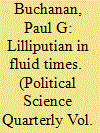

|
|
|
|
|
| Publication |
2010.
|
| Summary/Abstract |
Paul G. Buchanan looks at the evolution of New Zealand's foreign policy after the Cold War. He argues that New Zealand's ability to "punch above its weight" in contemporary international affairs was as much a product of fortuna as it was of policymaking virtu. It was only toward the end of the 1990s that a heterodox approach mixing realist, idealist, and constructivist ideas was confirmed as the basis for New Zealand's engagement with the world.
|
|
|
|
|
|
|
|
|
|
|
|
|
|
|
|
| 6 |
ID:
096661


|
|
|
|
|
| Publication |
2010.
|
| Summary/Abstract |
This article has two objectives. First, it interrogates the normative understanding of the identification of poor people as a technical process confined to the domain of experts. The paper analyses the construction of Below Poverty Line (bpl) status in India, and provides evidence for how this is contested at multiple levels of the policy process, through both formal and informal policy practices. Second, the paper uses a case study of a major anti-poverty policy, the Suvarnajayanti Gram Swarozgar Yojana, to demonstrate how the cumulative outcome of formal and informal policy practices is the erosion of the redistributive intent of policy. The paper emphasises the importance of foregrounding within policy discourse the politically contested nature of the processes of identifying poor people, and of determining their eligibility for anti-poverty policy resources. The typology of policy practices generated calls for deeper recognition of the significant influence of informal policy practices on the policy process in India.
|
|
|
|
|
|
|
|
|
|
|
|
|
|
|
|
| 7 |
ID:
096653


|
|
|
|
|
| Publication |
2010.
|
| Summary/Abstract |
Dennis F. Thompson analyzes the capacity of presidential primaries to provide a test of the constitutional character of candidates. He argues that the primary process should be judged to be more or less democratic on the basis of the effective opportunities it gives voters to assess the democratic commitments of the candidates
|
|
|
|
|
|
|
|
|
|
|
|
|
|
|
|
| 8 |
ID:
096660


|
|
|
|
|
| Publication |
2010.
|
| Summary/Abstract |
By examining the Congolese political economy through the lens of the 'resource curse' theory, this article aims to advance our understanding of the chronic underdevelopment of the Democratic Republic of the Congo (DRC). Proceeding in three distinct phases the article examines the effect of resource rents, foreignn aid and the likely effect of Chinese investment. It finds that a political tradition of patrimonialism and corruption based on large inflows of easily corruptible resource rents was established in the Mobutu period. In the post-conflict period the source of revenue shifted from resource rents to foreign aid, while the political tradition remained essentially unchanged. The model of the Congolese political economy established in these first two sections will then be used to make an informed assessment of the Sicomines deal. The article finds that the structured nature of the deals means that it is unlikely to perpetuate the 'resource curse' condition.
|
|
|
|
|
|
|
|
|
|
|
|
|
|
|
|
| 9 |
ID:
096664
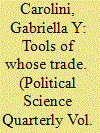

|
|
|
|
|
| Publication |
2010.
|
| Summary/Abstract |
As the adoption and harmonisation of international public sector accounting standards and guidelines strengthen, decision-making processes and definitions assumed in establishing accounting best practices become more critical objects of study. Especially for countries in the global South that are making efforts to converge with such international guidelines, a review is warranted of the creation of the UN's System of National Accounts (guiding the derivation of GDP, for example) and the International Federation of Accountants' public sector accounting standards. This paper endeavours to undertake such a review, concluding that, as currently designed and articulated, public sector accounting guidelines fail to adequately encompass and address the voices and concerns of governments in the global South.
|
|
|
|
|
|
|
|
|
|
|
|
|
|
|
|
| 10 |
ID:
096662


|
|
|
|
|
| Publication |
2010.
|
| Summary/Abstract |
This article categorises the emerging conceptualisations of Fair Trade and explores which of them offers the best characterisation of the project. It introduces Fair Trade and establishes a set of desiderata to guide the process of conceptualisation. It is argued that the practices and rhetoric of the project suggest it is best characterised as an attempt to establish a form of interim global market justice in a non-ideal world. Three alternative conceptualisations are explored, some including sub-categories. In each section a description of the view is outlined and it is argued that each such alternative is either an unpersuasive account of Fair Trade or cannot better the one already defended. In the final section the normative debate surrounding Fair Trade conceptualised as an attempt to establish interim global market justice in a non-ideal world is introduced. The article suggests that there are avenues for the project's ethical defence but concludes that this can be settled only with further research.
|
|
|
|
|
|
|
|
|
|
|
|
|
|
|
|
| 11 |
ID:
096652


|
|
|
|
|
| Publication |
2010.
|
| Summary/Abstract |
Robert Jervis argues that friction between intelligence agencies and policymakers is an inevitable product of their conflicting missions and needs. Policymakers need political and psychological support, while intelligence generally raises doubts, points to problems, and notes uncertainties. Relations do not have to be as strained as they were under President George W. Bush, but they will always be difficult.
|
|
|
|
|
|
|
|
|
|
|
|
|
|
|
|
| 12 |
ID:
096658
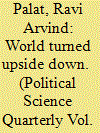

|
|
|
|
|
| Publication |
2010.
|
| Summary/Abstract |
By focusing on the consequences of the dismantling of regulations over the financial sector, the current debate on the causes of the global economic meltdown obscures the cyclical occurrence of speculation in capitalism, as the accumulation of more capital than can be profitably invested in the production and sale of commodities results in financial expansion. Historically financial expansion has signalled the end of one world-scale system of accumulation and the transition to a new system as capital flows from declining powers to rising powers. However, the contemporary period is distinguished by capital flows from rising powers to declining ones. An analysis of the current crisis suggests a reversal of this anomaly as it reduces the ability of China and other East Asian states to support the US dollar. At the same time 'emerging market economies' have begun to forge new relationships that could provide the framework for a new system of partnership between states and enterprises to reconstruct a new cycle of accumulation if two hurdles are overcome: 1) absorption of labour that is being displaced because of the high organic composition of capital and 2) dampening of the growing inequalities in income which has not only restricted the growth of markets but is also fuelling increasing social conflict.
|
|
|
|
|
|
|
|
|
|
|
|
|
|
|
|